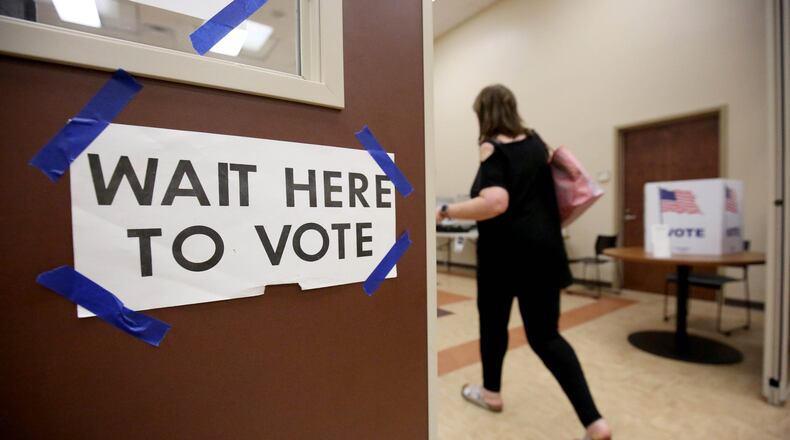A dispute between Fulton County and its cities about the cost to run elections has frustrated leaders and led the county to cut back on early voting this fall.
Officials in several north Fulton cities said they were shocked by what they called excessive costs to run city elections and demanded the county look for ways to save money.
That led to a decision by the county to reduce the number of polling places, hours and days for early voting.
“This makes me even angrier,” Roswell Mayor Lori Henry said upon learning that the East Roswell library was one of the proposed polling locations that wouldn’t open for early voting in the fall. “I am so frustrated with this and I am so frustrated with Fulton County.”
The county had originally proposed opening 16 early voting locations, but reduced the number to nine after Henry and others said they thought the costs were too high. Roswell elections were slated to cost nearly $535,000, more than $200,000 more than the cost had been in 2017.
The city’s elections are now estimated to cost about $375,000, a figure that is still more than $60,000 higher that what Roswell budgeted.
“Fulton doesn’t really have competition,” Henry said. “They have us over a barrel on elections.”
While some Fulton County cities perform their own elections and one, Mountain Park, contracts with Cherokee County, the other cities are required to contract with Fulton if they don't want to go it alone, Henry said. She's asked Sen. John Albers, R-Alpharetta, to put forth legislation that would allow cities to contract with neighboring counties to perform elections.
Albers confirmed that he plans to file that legislation, saying he supports “giving our cities options for running elections to reduce the cost and improve the experience.”
But Richard Barron, Fulton's director of registration and elections, said the overall cost of municipal elections is lower this year than 2017. It's just that the county's method of cost-sharing divides the bill among all participating cities, and this year, neither Atlanta nor Sandy Springs is holding city elections. Those are the county's biggest cities, and in 2017, during its mayoral race, Atlanta shouldered 58% of the cost of the election.
Without those two cities' contributions, Barron said, everyone else is being asked to pay more. Additionally, the county will train poll workers in person to ensure they understand their jobs, and will send mailings to all heads of household to ensure they know where their polling places are, which also adds to the costs. So does security, and there has been an increasing need for security at polling locations.
Still, the early voting reductions by his office cut costs by 28% for Johns Creek and 44% in Alpharetta, in addition to the 30% decrease in Roswell. The savings amounted to more than $400,000 for just those three cities.
The trade-off, Barron said, is less accessibility for early voting. In addition to the reduction in sites, early voting will not be available on the weekends, or after 5 p.m.
“It’s unfortunate for the voters,” Barron said. “We’ve expanded early voting, and we were trying to keep that going.”
Liz Hausmann, a Fulton County commissioner who represents part of north Fulton, said cities there balked at cost breakdowns that included a share of Medicare and Social Security contributions for staff. She said such a breakdown doesn’t make the county seem like it’s a good partner to the cities.
“I feel strongly that if we conduct elections, we conduct elections,” she said.
Hausmann said she didn’t think the cities were trying to get out of paying for elections entirely, but that the large cost increases “sent some of the cities into a quandary” about how to pay for them.
Barron said the county divides the cost of municipal elections among the cities that are voting based on the number of eligible voters. If the county is holding an election — in November, it is not — the cities are only required to pay 10 percent of that cost.
Henry said she was glad the county had reduced the numbers, but she didn’t think cities should be responsible for worker training or mailers that they didn’t ask for.
"I just feel like they're taking advantage of us because we're required by state law to contract with them," she said.
Barron said the county doesn’t charge anything more than the cost of the election.
“If you have an election as a municipality, you should have to pay for it,” he said.
About the Author
The Latest
Featured



